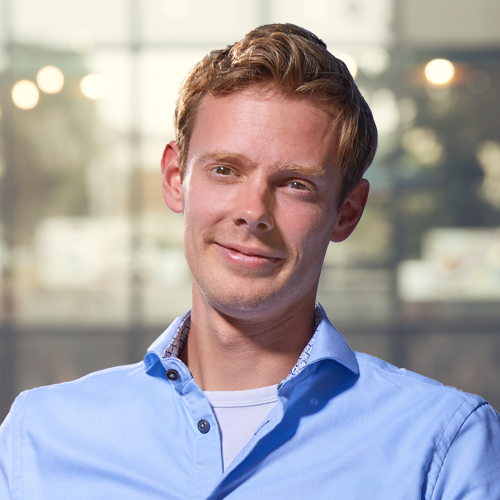
Jurrit Bergsma

'The shipping industry is like a big vessel: it takes time to change course, but when we are on route, we’re unstoppable'.
Jurrit Bergsma and his colleagues are looking for solutions to the challenges of making the shipping industry more sustainable. He does this as a scientist integrator and a PhD candidate, both for the shipping industry itself and the world in which we live.
There’s still a long way to go before all shipping, inland navigation and ports are climate-neutral. There are major interests at stake in this internationally-oriented sector, and the desire for greater sustainability is by no means equally strong everywhere.
At TNO, we want to accelerate the maritime energy transition. We’re conducting research into circularity, smart logistics, energy-efficient motors and alternative fuels in order to show the maritime sector what’s possible. In principle, the Netherlands has all the knowledge, skills, people and stakeholders needed to fulfill a leading role internationally.
Green business case
The maritime sector still runs on fossil energy. Many ships use fuel oil and have high CO2 emissions. We can improve this with short term available technology, such as by sailing on (bio-)methanol. An even greater step towards greater sustainability can be made with hydrogen fuel cell technology for ship types that do not travel extreme distances.
However, there is overall still a great deal of uncertainty on the energy carrier of the future and what its impact will be on ships and in ports. This has an effect on the green business case because uncertainty almost always means extra costs. In order to overcome this situation, we’re conducting pilots in smart places in order to show that the technology works and what the economic impact will be, such as with maintenance vessels for offshore wind farms. Ultimately, the aim is to realise the green business cases as quickly as possible, thereby convincing the sector and its customers that sustainability is not merely an option but rather a logical choice.
It happens at sea
A lot is going to change in the North Sea over the next 20 years. Drones will carry out tasks which currently use manned vessels, such as the surveillance and maintenance of offshore infrastructure. .It is important that clear and supportive regulatory preconditions are created so that the green business case is brought closer to reality. Think of emission taxes and green tendering. The government has an important role to play in these.
This requires a strong management of the creation of these preconditions. In all scenarios we will see a rapidly evolving maritime sector in the North Sea with floating islands, seaweed farms and offshore wind parks of an enormous scale. With the combined knowledge, skills and preconditions, we can create great added value in a sector that already employs more than 260,000 people in the Netherlands.
Sailing
I’ve been a sailor since an early age and have a strong intrinsic motivation to make a societal contribution linked to sustainability. The choice of Maritime Engineering at TU Delft and sustainability was therefore logical. . I learned a lot about technological innovation, but also about how to involve people in it. As a scientist integrator at TNO, that’s where I can really make a difference.
The shipping industry can be compared to a big vessel: not very manoeuvrable but once on a course, we keep going. This is why it’s incredibly important to set the course for sustainable shipping as soon as possible, for both the shipping industry itself and for the world in which we live.
Den Haag - New Babylon
Anna van Buerenplein 1
2595 DA The Hague
The Netherlands
Postal address
P.O. Box 96800
2509 JE The Hague
The Netherlands
-
Telefoon:+31 88 866 00 00
Get inspired by Jurrit
Five steps towards sustainable shipping by 2050

